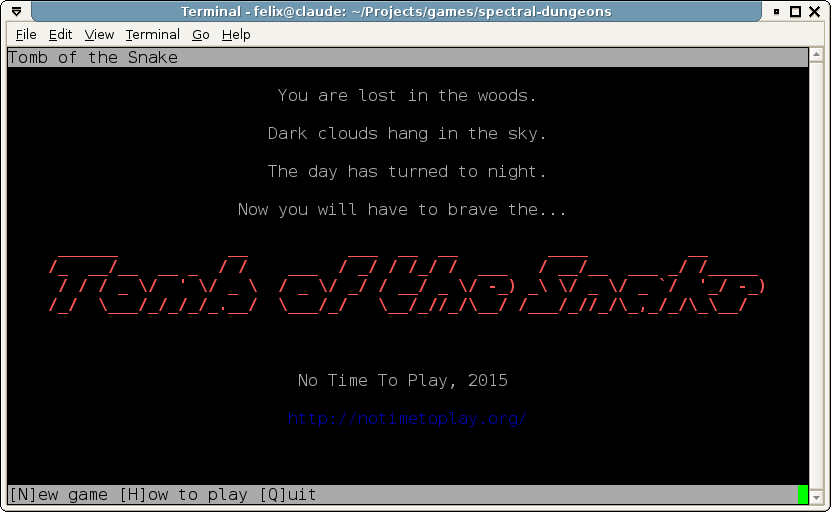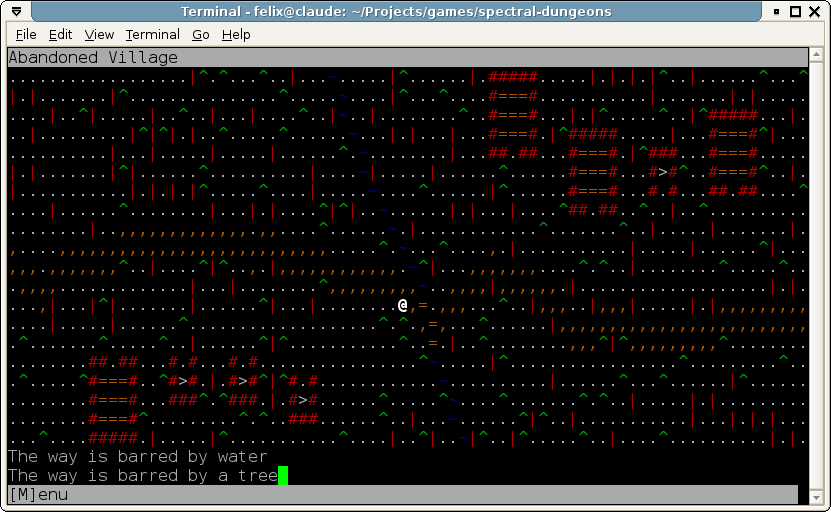Weekly Links #56
These really aren't good days for me. Took me a week to put together less than 500 lines of code, mostly copy-pasted from elsewhere too. But persistence pays, and right now I can at least show you a couple of screenshots:
 Title Screen
Title Screen
 Game screen
Game screen
As I pointed out last time, it's a roguelike for the Linux console, written in Python. I happen to like the language anyway, and since it comes with a curses module by default that means I can have exactly zero dependencies apart from Python itself. As for why text mode, I'm seriously bothered by the gratuitous overuse of technology these days. When text-based roguelikes require SDL or even OpenGL (wish I was kidding), something's rotten in the state of IT. Several of my friends work in text mode at least some of the time, their reasons ranging from tradition to poor eyesight. And having done real work on remote servers over SSH, I know that making text-based user interfaces is a skill worth acquiring.
More about the game itself next week; for now, on to the links.
In this age of digital distribution, you'd think publishers would be smarter about keeping their back catalogues in stores. Especially with Good Old Games out there, busily proving everyone just how much of a market for classics there is. Some of them, I suspect, are afraid that old titles would eat into the sales of newer games, but there are two problems with that:
- Those old titles circulate anyway unofficially and for free. Don't you want to have them on sale instead?
- If people would rather buy an old game than a new one, maybe you should take a long hard look at your current practices.
And then you have Nintendo, who likes to pretend they're not a game publisher at all, but rather a hardware vendor. Much like Apple before the grand switch to Intel, and remember how they almost went out of business over it? Guess it's just that hard for an old successful company to accept when the world has changed from under their bottom line...
Not that I care about big publishers anymore. Their days have passed, and nowadays it's all about the indies. But indies have to work hard for their success; as Jay Barnson points out, no, Minecraft didn't sell itself. But! A lot of people seem to have gotten into their heads that marketing is this mysterious and kind of dirty job done by people in suits deep in the bowels of multinationals. When in fact it's simply getting out there, talking to people and making them want to buy from you. And you know, I see a lot of people asking why they should be taking the advice of someone who hasn't exactly sold
much... of anything. But I have friends working a lot harder and getting way less in the way of return on investment, so how bad am I doing, really?
In unrelated news, the same Jay Barnson warns about the need to wear many hats as an indie game developer. And I'll be the first to point out that any remotely modern game is 80% art assets and 20% programming. But is that a good thing? Isn't programming what makes computer games be what they are, more than a collection of pretty pictures? Here I am, working on a game with no graphics at all, which isn't even unusual. But you just try making a game with no programming! (And before you point at Game Maker, that's programming too, I assure you -- just not in the form of source code.) To top it all, the reverse is true: you can make art procedurally, and high quality art at that. So maybe don't worry so much and focus on whatever you like doing? Because that's the part that will come out special -- the one people will notice.
But I'm all out of witty conclusions. See you next time.